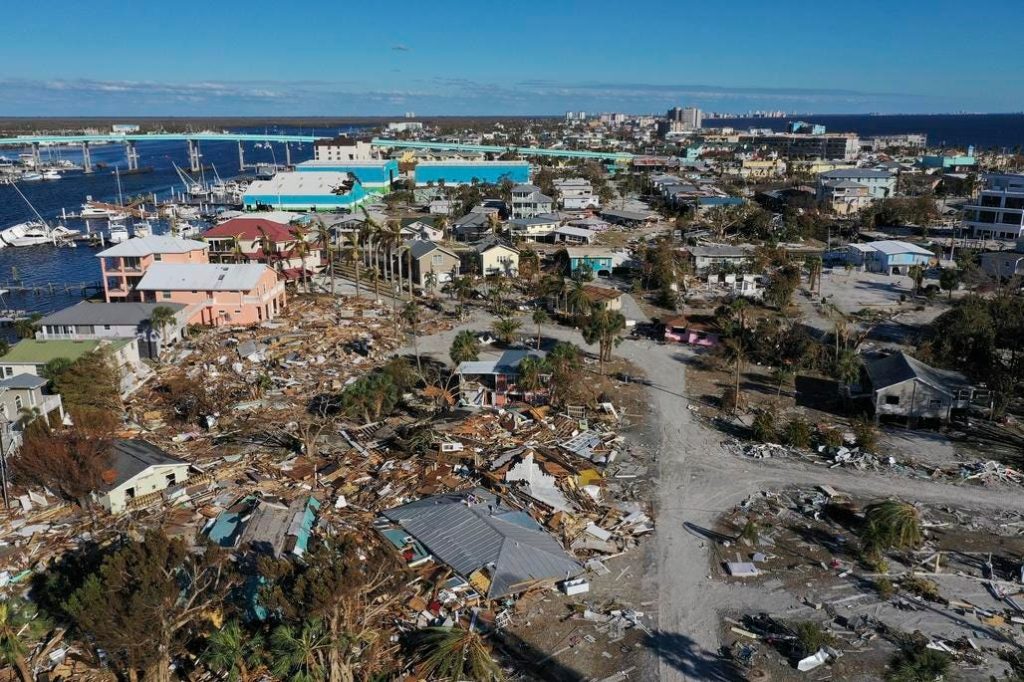This week’s Current Climate, which every Saturday brings you the latest news about the business of sustainability. Sign up to get it in your inbox every week.
Earlier this week, Farmers Insurance said that it is going to be pulling out of the state of Florida, according to Insurance Journal, in a move that will potentially impact up to 100,000 policyholders once their current terms are completed. It’s the fourth major insurance company to pull out of Florida in the past year. Insurance Journal reports that the reason for Farmers pulling out was to “effectively manage risk exposure.” Those same risk management needs drove the company’s decision to limit new policies in California earlier this year as well.
There’s a lot of risk to be had in Florida, and one major factor behind that risk is climate change, which is causing more severe weather events this year so far, which is expected to be the hottest year on record. Florida’s CFO Jimmy Patronis blamed the insurer’s decision on being “woke” (a word that is quickly losing all meaning), but in the past two and half years, 10 property insurers in Florida have become insolvent. Across the country, seven states so far have seen over $1 billion in damages caused by severe weather, according to insurance group BMS, with Texas leading the pack at over $7 billion in severe weather damages this year.
Meanwhile, ocean temperatures in Florida have reached unprecedented levels, according to the National Oceanic and Atmospheric Administration. High oceanic temperatures provide fuel for hurricanes, making them both more likely and more severe. Thanks to this and other factors, Colorado State University has updated its hurricane season forecast, which now calls for an above-average hurricane season thanks to a combination of high ocean temperature and El Niño.
The Big Read
‘It’s An Embarrassment’: The Downfall Of A $2 Billion SoftBank-Backed Smart Window Company
View Inc. raised billions promising tint-shifting windows that saved energy costs. With built-in, transparent circuit boards, the panes also served a dual purpose, transforming into giant computer or presentation screens. Investors like SoftBank and the sovereign wealth funds of New Zealand and Singapore poured in capital. But its ambitions have been shattered amid fraud charges and a decrepit share price at the Milpitas, California-based company. The company reportedly laid off almost a quarter of its workforce earlier this year and just last week settled charges brought by the Securities and Exchange Commission.
Read more here.
Discoveries And Innovations
French company The Searial Cleaners has developed a robotic drone that’s capable of cleaning up trash around marinas, docks and other public places near the ocean.
Green cement company Brimstone announced that its carbon-negative portland cement has been certified as meeting industry standards for cement. .
Death Valley is forecasted to reach 131 degrees on Sunday–if it does so, that will set a new world record for the hottest temperature ever reliably recorded.
Some parts of the world’s oceans have changed color to become greener by 56%, likely due to human-caused climate change, a recent study finds.
Reports estimate that over 114,000 new jobs in clean energy were created in 2022 and over $240 billion in new clean energy investments have been announced since the Inflation Reduction Act was signed into law.
The Big Transportation Story
A Stealthy L.A. Carbon Capture Startup Snags $80 Million From Big Oil And JetBlue
Avnos is the latest Los Angeles-based startup with new ideas to help eliminate some of the vast amount of CO2 in the atmosphere belched out by cars, trucks, factories and power plants. The company from stealth recently announcing that it’s got at least $80 million of backing from big industrial companies, including ConocoPhillips and the venture arms of Shell and JetBlue. It’s offering something of a twofer in the direct carbon capture space: suck out CO2 and produce water as a byproduct. That could make it appealing to increasingly parched parts of the world, including the Golden State.
Read more here.
Sustainability Deals Of The Week
Lab-Grown Cotton: Boston startup Galy has inked a deal with Japanese manufacturer Suzuran Medical Inc., which will use the startup’s lab-grown cotton in a 10-year, $50 million partnership.
Carbon Capture: ExxonMobil announced that it’s acquiring clean energy company Denbury for $4.9 billion–which has a side effect of giving the oil & gas giant the nation’s largest CO2 network which it can utilize for carbon capture and storage.
Fusion Power: The Fusion Industry Association reports that nuclear fusion power startups have attracted over $1.4 billion in investment over the past year.
Ocean Data: Bedrock, which develops underwater autonomous vehicles to monitor the seafloor, announced it has raised a $25.5 million series A funding round led by Northzone and Primary Venture Partners.
What Else We’re Reading This Week
Here’s how global warming will change your town’s weather by 2080 (Popular Science)
‘Greenhushing’: Why some companies quietly hide their climate pledges (The Washington Post)
VW to Trade Electricity, Weighs Large-Scale Battery Storage (Bloomberg)
For More Sustainability Coverage, Click Here.
Read the full article here










